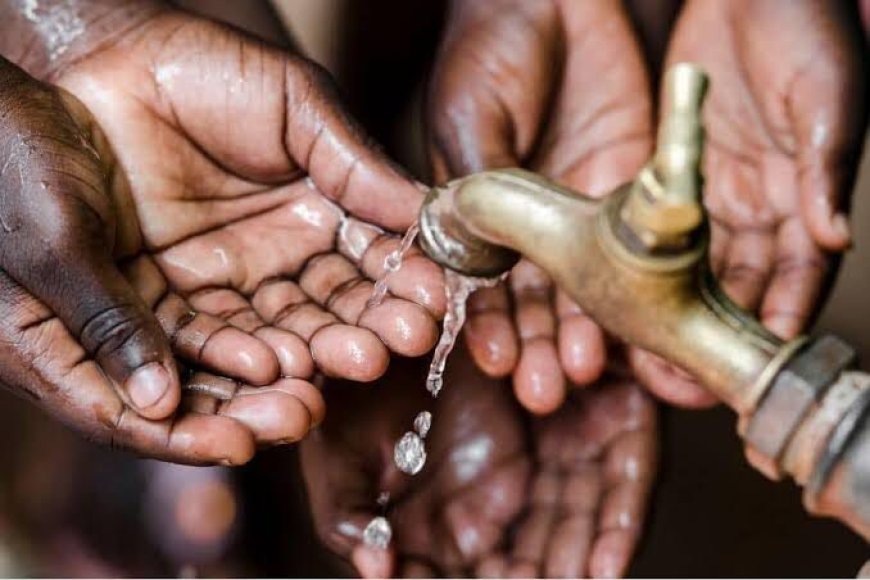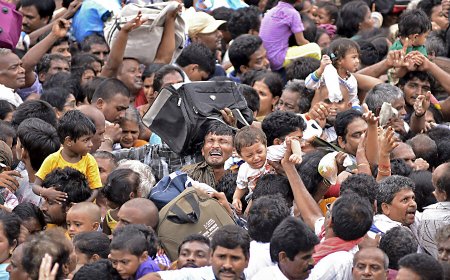Water Scarcity: The Basics You should Know
Delve into the intricate web of challenges posed by water scarcity, from its origins in pollution and population growth to its profound impacts on agriculture, health, and economies. Explore the ripple effects on ecosystems and international relations, as nations grapple with dwindling water resources. Discover strategies for sustainability and the imperative for collective action to avert catastrophe and secure a water-secure future for all.

As we all know water is very crucial to Man and every organism. The importance of water in every aspect cannot be undermined. If you know Aproko Doctor, you would have heard him shout 'drink water' countless times.
Scientists collaborated to the fact that the creation of life started on water after a series of chemical reactions occurred on it. This shows the extent to which water can be seen as the source of life. I’m sure we all know what water is, however lets give a simple definition of water. According to research, water is an inorganic compound with the chemical formula H2O. It is a transparent, tasteless, odourless, and nearly colourless chemical substance, and it is the main constituent of Earth’s hydrosphere and the fluids of all known living organisms (in which it acts as a solvent). A pure water is not meant to have less than 7 PH which then equates it to been a good and drinkable water. That means pure water is essential to Man as well as all the resources found in the ecosystem. That is why in this article our focus is on the impact of water scarcity. However, before we discuss the impacts lets discuss the meaning of water scarcity and its causes.
Meaning and Causes of Water Scarcity
According to research, it is said that about 97.5% of the water in the world is salt water, while the remaining 2.5% is freshwater but of this 2.5% only 0.3% is in liquid form. This is to explain that the amount of freshwater humans and every organism are depending on is very limited. However small this percentage might be, it is known to serve humans adequately. But in recent times there have been research which states that two third of the world population experience water scarcity. This is to say some countries are experiencing this water scarcity. Example of these countries are Lebanon, Pakistan, Afghanistan, Turkey etc. These countries are currently facing a different problem different from COVID 19. However, for us to fully grasp the depth and intensity of water scarcity, let’s define it and explain the causes. Water Scarcity is the unavailability of clean water which could meet the needs of the people. Wikipedia defines it as lack of freshwater resources to meet the standard water demands. If less water and unclean water results to water scarcity then what leads to this?
Well, let's discuss the causes of water scarcity.
-
Misuse of Water: It is a popular saying that one does not know the worth of something until the thing is no longer available. It is with no doubt and backed with substantial evidence the rate at which humans especially waste water. For instance the amount of water wasted in taking a bath could be reduced by the people in an effort to preserve the water. There are cases whereby people turn on the running water in the toilet, bathroom or kitchen and then forget to turn it off. This leads to a total waste of water resources that could have been used for other purposes.
-
Water Pollution: Water pollution is another cause of water scarcity because in several instances there are cases where people make use of chemical substance which ends up flowing into the river and then contaminating and making it unsafe to drink.
-
Population Growth: This is another alarming cause of water scarcity in the society. Everyday our population keeps increasing in the world however we all have to depend on the less than 1% water that is available.
-
Climate Change: The fluctuations in climatic conditions does not improve the situation. The sudden change in our weather also contributes to this scarcity and most especially during the dry seasons in the Northern areas. The effect of this drought can be felt on the agricultural products as they tend to demand more water than usual.
-
Waste of Food and Fruits: To waste food can be equated to wasting water because water goes a long way into making this food a success or edible enough to eat. Many a times people buy food and fruits they do not eat and end up throwing them away. All this careless attitude by human contributes to the scarcity of water in the communities.
These are some of the causes of water scarcity in the communities and it is important we all take solid steps in reducing our water consumption, usage and misuse. This is geared towards, having a sustainable environment with enough water. The impact of water scarcity can be very massive, this can be seen in some notable areas that experienced this scarcity. What are those impacts that we are referring to
Impacts of water scarcity in the society
We all know that to grow crops, water is very essential, now imagine there’s little or no water left, or in some cases the water has been polluted. This would hinder the growth of the crops as well as people’s means of survival. Water Scarcity is a hindrance to the availability of food and other edible items to the society. As a result, people would end up hungry and dying of starvation.
According to scholars, Water Scarcity can be seen in different light, as we have physical and economic water scarcity. Physical water scarcity is when there is not enough water to meet the needs of the people while economic scarcity is simply the unavailability of water because of monetary reasons. This is to point to us that sometimes water scarcity is human induced like we said above on pollution and this always have an adverse effect on the people in form of sickness, disease and starvation.
Another impact of water scarcity we should emphasize on is the economy. Water Scarcity does not only affect the people and their health but also affects the economy of the society. Inadequate access to water supply can slow down works in industries, it can reduce rate of production which would negatively impact the society on the long run. Situations like this investors can pull out their investments for fear of losing their money and some other crucial aspects in the business world.
During water scarcity not only the humans are on the receiving end, even the ecosystem in general is affected. The rivers, lakes, streams are all affected when there’s decrease in water as this would also give chance to increase in the salinity of the water. There’s gradual decrease of plants and animals in the biodiversity as a result of less water in the environment. It doesn’t stop there as water scarcity is known to cause rift between countries as they begin to fight over the water in a particular region, this can lead to war which ends up in the death and displacement of people. Some migrate from one country to another in a quest in finding water.
Water Scarcity is very scary and dangerous as it could lead to a great number of disaster if we refuse to learn how to become water sustainable. Although recent research shows we still have enough water to depend on however, concerns are also made as regards human population that’s ever increasing. If this continues it would later pose a threat to the water remaining in the ecosystem. In other words, as much as some countries are fortunate to have enough water supply at their domain, there should also be a consciousness of the fact that some countries barely have enough water to survive. This is to say that we need to learn how to conserve and be sustainable. Some countries like Israel, China, Egypt etc. are well known for their habits in recycling water for use as a result of less water in their region. This are method of sustainability which can be adopted to ensure less waste of water. Other methods of sustainability is to reduce water pollution and reduce the waste of food because it takes certain amount of water to grow this items. Again, waste of food automatically equals to waste of water. Countries that are over populated should also look for methods to adjust their population so as to ensure that water scarcity can be reduced and avoided to some extent. It is also important for the government to invest in water infrastructures as this would also help to address the issue of water scarcity.
In conclusion, water scarcity should be seen as a pandemic, a disease that should be avoided at all cost and if it has occurred in a society before, measures to ensure there’s no recurrence of this pandemic should be put in place.
What's Your Reaction?





































































































